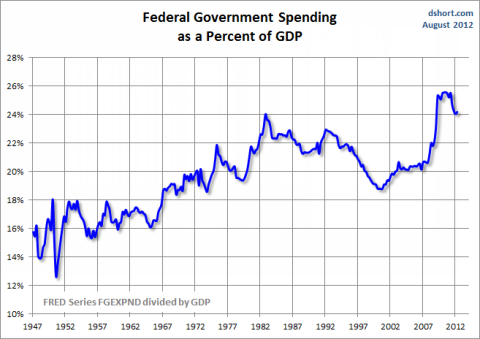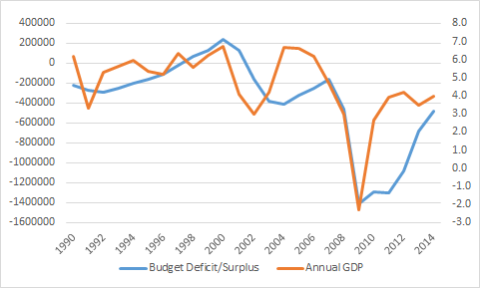Share the post "The Budget Deficit is (Mostly) Endogenous" People love to assign economic blame or credit to the President. Government debt and deficits are particularly popular talking political points when one is trying to confirm their political bias. For instance, since President Obama took over in 2008 we constantly hear Republicans talk about how he has expanded government debt. Since 2011 he’s been widely credited by Democrats with bringing the deficit down. This is almost always a misleading story. One myth that I’ve discussed in detail in the past is the Clinton surplus and how Democrats like to cite this as an economic positive (which it wasn’t, but that’s a story for another day). The problem, however, is that the President really doesn’t control the direction of the budget deficit or surplus thanks primarily to its endogeneity. I was talking about this yesterday on Twitter when Brad Delong and Noah Smith became enraged at me for saying that Clinton didn’t really cause the budget decline of the 1990’s. Noah posted the following chart and then claimed that the 1993 Omnibus Budget Reconciliation Act set the stage for the deficit decline and the surplus. He claimed that the spending cuts started in 1993 after Clinton’s budget passed. This all looks like a plausible story if you squint your eyes and wave a Democratic flag.
Topics:
Cullen Roche considers the following as important: Most Recent Stories
This could be interesting, too:
Cullen Roche writes Understanding the Modern Monetary System – Updated!
Cullen Roche writes We’re Moving!
Cullen Roche writes Has Housing Bottomed?
Cullen Roche writes The Economics of a United States Divorce
People love to assign economic blame or credit to the President. Government debt and deficits are particularly popular talking political points when one is trying to confirm their political bias. For instance, since President Obama took over in 2008 we constantly hear Republicans talk about how he has expanded government debt. Since 2011 he’s been widely credited by Democrats with bringing the deficit down. This is almost always a misleading story.
One myth that I’ve discussed in detail in the past is the Clinton surplus and how Democrats like to cite this as an economic positive (which it wasn’t, but that’s a story for another day). The problem, however, is that the President really doesn’t control the direction of the budget deficit or surplus thanks primarily to its endogeneity.
I was talking about this yesterday on Twitter when Brad Delong and Noah Smith became enraged at me for saying that Clinton didn’t really cause the budget decline of the 1990’s. Noah posted the following chart and then claimed that the 1993 Omnibus Budget Reconciliation Act set the stage for the deficit decline and the surplus. He claimed that the spending cuts started in 1993 after Clinton’s budget passed.
This all looks like a plausible story if you squint your eyes and wave a Democratic flag. Except for the fact that the spending “cuts” clearly peaked in 1983. If one were politically biased you could find some cool sounding Reagan storyline here about how he cut spending drastically. Or, you could do what many Republicans do and cite the 1990 Budget Enforcement Act as the policy that really kickstarted our way to surplus. See how that works? Depending on your political preference you can basically torture the data and the storyline enough to make it say whatever you want it to.
The alternative approach is to remove the political bias from much of this and look at what has mainly driven the budget in the last 30 years: the state of the economy. And if we look at the budget fluctuations relative to economic growth we see a clear pattern:
You can clearly see that the budget fluctuates with the economy because almost 70% of spending is non-discretionary spending that is largely impacted by automatic stabilizers. So, when the economy is strong the deficit naturally contracts and when the economy is weak the deficit naturally expands (as automatic spending and tax receipts increase/decrease). Clinton didn’t cause the deficit to decline any more so than he caused the 90’s economic boom. Likewise, Obama didn’t cause the 2008-2011 deficit expansion any more so than he caused the economic collapse.
This doesn’t mean Presidents don’t have any impact on the budget. That would be wholly naive. But I think many economists and pundits have a tendency to assume causation where there is mostly correlation. It makes for good political talking points, but it makes for very biased and bad economics.


